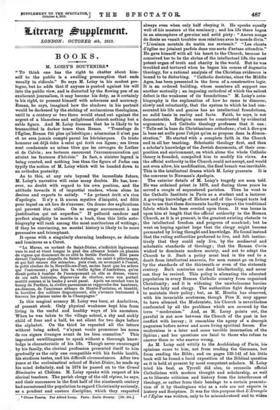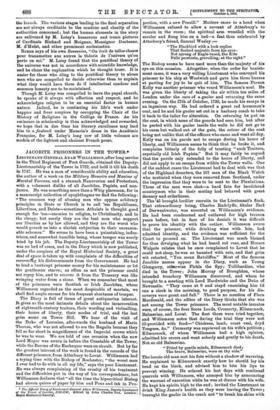BOOKS.
M. LOISY'S SOUVENIRS.* " To think one has the right to chatter about him- self to the public is a swelling presumption that ends usually in ridicule." So says M. Loisy in his modest pro- logue, but he adds that if anyone is pushed against his will into the public view, and is distorted by the flowing pen of an exuberant journalism, it may become his duty, as it certainly is his right, to present himself with soberness and accuracy. Renan, he says, imagined how the shadows in his portrait would be darkened by the etching of acrimonious theologians, until in a century or two there would stand out against the argent of a blameless and enlightened church nothing but a sable figure. And M. Loisy foresees that he is likely to be transmitted in darker tones than Renan. " Transfuge de l'Eglise, Renan fat plus qu'heretique ; neanmoins it n'est pas et ne sera jamais compt6 parmi les heresiarques. Ce triste honneur est dejh echu a celui qui ecrit oes lignes; sea livres sont condamnes au meme titre que les ouvrages de Luther et de Calvin ; sea lecteurs encourent l'excommunication qui atteint lea fauteurs d'heresie." In fact, a sinister legend is being created, and nothing less than the figure of Judas can typify the notion of M. Loisy which will be handed down to an orthodox posterity.
As to this, at any rate beyond the immediate future, M. Loisy's narrative will raise many doubts. He has, how- ever, no doubt with regard to his own position, and the attitude towards it of impartial readers, whom alone he desires and expects to satisfy. "Le present ecrit n'a rien d'apologie. Ii n'y a la aucun mystere d'iniquite, nul delit pour lequel on ait lieu de s'excuser. On donne des explications qui peuvent etre utiles. On ne songe aucunement 3, une justification qui est superfine." If pellucid candour and perfect simplicity be merits in a book, then this little auto- biography will rank among the most meritorious of writings ; if they be convincing, no mental history is likely to be more persuasive and triumphant.
It opens with a singularly charming landscape, as delicate and luminous as a Corot.
"La Marne, en sortant de Saint-Dizier, s'inflechit legerement vers le sud et vient longer le pied des ceteaux boises ou plantes de vignes qui dominent de ce cote le fertile Perthois. Elle passe devant l'antique chapelle de Saint-Aubain, un saint a pelerinages, et qui fait encore des miracles ; puis c'est, en avancant a Fouest, le petit clocher de la Neuville-au-Pont, morns haut qua les arbres qui l'entourent ; plus loin la vieille eglise d'Ambrieres, qu'on dirait prate a. tomber de rescarpement oil elle se dresse, veuvo de ses reefs laterales, depourvue de clocher, avec son portail mutile comme si la hache y avait passé. Apres un crochet vers le bourg de Perthes, in riviere paresseuse se rapproche des hauteurs, au-dessous, de l'ancienne abbaye de Haute-Fontaine, et bientot, in barriere des collines disparaissant, elle s'avance lentement a travers los plaines unies de in Champagne."
In this magical scenery M. Loisy was born, at Ambrieres, of peasant stock. Only physical weakness kept him from living in the useful and healthy ways of his ancestors. When he was taken to the village school, a shy and sickly
child of four and a half, he sat silent for two days before the alphabet. On the third he repeated all the letters without being asked, " n'ayant voulu prononcer les noms de ces signer etranges avant de les bieu connaitre." This ingrained unwillingness to speak without a thorough know- ledge is characteristic of his life. Though never encouraged by his family, the clerical profession presented itself to him gradually as the only one compatible with his feeble health, his studious tastes, and his difficult circumstances. After two years at the ecclesiastical school of Saint-Dizier, he made up his mind definitely, and in 1874 he passed on to the Grand Sentinaire at Chalons. M. Loisy speaks with respect of his clerical teachers. The parish clergy of the old regime, be says, and their successors in the first half of the nineteenth century had accustomed the population to regard Christianity seriously, as a prudent and austere discipline, which they respected
• Chows Passees. Par Alfred Loisy. Paris: Emile Nourry. [3fr. 50c.]
always even when only half obeying it. He speaks equally well of his masters at the seminary ; and his life there began in an atmosphere of genuine_ and solid piety : " Aucun nuage de doute ne venait troubler mes relations avec le monde divin." "L'oraison mentale du matin me ravissait." "Les chants d'eglise me jetaient parfois dans une sorte d'extase attendrie." He gave himself with all his heart to the Church, because he conceived her to be the shrine of the intellectual life, the most potent organ of truth and charity in the world. But he was troubled and tortured when he began his course of dogmatic theology, for a rational analysis of the Christian evidences is bound to be disturbing. " Catholic doctrine, since the Middle Ages, has been presented in the form of a constructive logic. It is an ordered building, whose members all support one another mutually ; an imposing cathedral of which the salient defect is the weakness of its foundations." M. Loisy's auto- biography is the explanation of how he came to discover, slowly and reluctantly, that the system to which he had con- secrated his life and genius has no intellectual foundations, no solid basis in reality and facts. Faith, he says, is not demonstrable. Religion cannot be constructed by evidential arguments ; but Catholic theology professes that it can : " Telle est la base du Christianisme orthodoxe ; e'est a dire quo in base est nulle pour l'objet qu'on se propose dans la demon- stration." He started with a complete faith in the Church and in all her teaching. Scholastic theology first, and then a scholar's knowledge of the Jewish documents, of their com- position and environment, on which alone the whole Catholic theory is founded, compelled him to modify his views. As the official authority in the Church could not accept, and would not even allow, his modification, the final breach was inevitable. This is the intellectual drama which M. Loisy presents. It is the converse to Newman's Apologia.
The exterior details of M. Loisy's tragedy are soon told. He was ordained priest in 1878, and during three years he served a couple of sequestered parishes. Then he went to the Catholic Institute in Paris as a student and a lecturer. A growing knowledge of Hebrew and of the Gospel texts led him to see that these documents hardly support the traditional fabric which has been erected upon them. It was borne in upon him at length that the official authority in the Roman Church, as it is at present, is the greatest existing obstacle to the intellectual freedom and progress of mankind; but he went on hoping against hope that the clergy might become permeated by living thought and knowledge. He found instead that the ruling authorities preferred to live, and felt instinc- tively that they could only live, by the mediaeval and scholastic standards of theology ; that the Roman Curia wished to dominate modern society, and not to adapt the Church to it. Such a policy must lead in the end to a death from intellectual anaemia, for men cannot go on living by the standards of the thirteenth or even of the sixteenth century. Both centuries are dead intellectually, and never can they be revived. This policy is alienating the educated population in every Roman Catholic country from organized Christianity; and it is widening the unwholesome barrier between laity and clergy. The authorities fight desperately to maintain their policy ; but, as M. Houtin has observed, with his invariable acuteness, though Pius X. may appear to have silenced the Modernists, his Church is nevertheless confronted by all the problems which are covered by the term " modernism." And, as M. Loisy points out, the parallel is not now between the Church of the past in her conflict with heresy ; it resembles the agony of a decrepit paganism before newer and more living spiritual forces. For modernism is a later and more terrible incarnation of the Sphinx ; and her questions are fatal to those who refuse to answer them or who answer wrong.
As M. Loisy said wittily to the Archbishop of Paris, his opinions came to him, not from reading the Germans, but from reading the Bible ; and on pages 139-141 of his little book will be found a lucid exposition of the Biblical question as it is held at present by most competent scholars. M. Loisy tried his best, as Tyrrell did also, to reconcile official Catholicism with modern thought and scholarship, as well as to liberate criticism and history from the interference of theology, or rather from their bondage to a certain presenta- tion of it by theologians who as a rule are not exerts in history and Scripture. It was for this purpose that L'Aeangile et l'Eglise was written, only to be misunderstood and to widen
the breach. The various stages leading to the final separation are not always creditable to the candour and charity of the authorities concerned ; but the human elements in the story are enlivened by M. Loisy's humorous and ironic pictures of Cardinals Richard and Meignan, Monsignor Duchesne, M. d'Hulst, and other prominent ecclesiastics.
Henan says of his own Souvenirs, "On ecrit de telles choses pour transmettre aux autres la theorie de l'univers qu'on porte en soi." M. Loisy found that the pontifical theory of the universe was not in accordance with scientific knowledge, and he chose the explanation which he thought truer. It is easier for those who cling to the pontifical theory to abuse men who are compelled to decide otherwise than to explain what they would have them do if intellectual candour and common honesty are to be maintained.
Though M. Loisy was compelled to leave the papal church, he speaks of it always with affection and respect, and he acknowledges religion to be an essential factor in human nature. Indeed, he is continuing his life's work under happier and freer auspices by occupying the Chair of the History of Religions in the CollCge de France. As his eminence in scholarship is thus acknowledged and rewarded, we hope that in due time his literary excellence may lead him to a fauteuil under Mazarin's dome in the Academie Francaise, for M. Loisy's long row of little -volumes are models of the lightest and choicest French prose.



































































 Previous page
Previous page